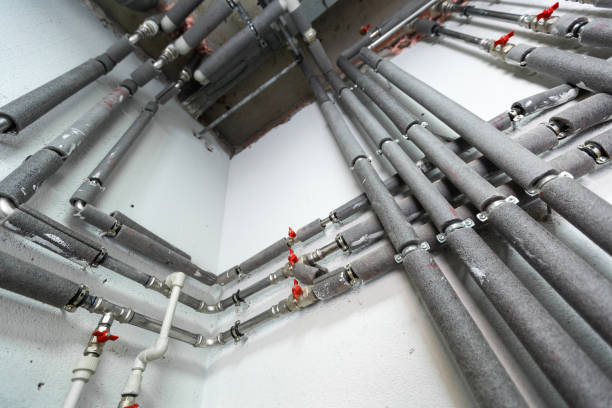Which Pipes to Insulate: A Practical Guide for Homeowners
Discover which pipes to insulate with this practical guide for homeowners by FUNAS. Learn how proper pipe insulation saves energy, prevents freezing, and reduces costs. Find expert tips on which pipes to insulate for optimal home protection.
- Introduction
- Why Pipe Insulation Matters
- Which Pipes Should You Insulate?
- Hot Water Pipes
- Cold Water Pipes
- Pipes in Unheated Areas
- Outdoor Pipes
- Types of Pipe Insulation Materials
- Foam Insulation
- Rubber Insulation
- Fiberglass Insulation
- Polyethylene Insulation
- Tools and Materials Needed
- Step-by-Step Guide to Insulating Pipes
- Step 1: Choose the Right Insulation Material
- Step 2: Measure the Pipes Accurately
- Step 3: Cut and Install the Insulation
- Step 4: Secure the Insulation Properly
- Step 5: Check for Gaps and Seal Them
- Common Mistakes to Avoid When Insulating Pipes
- Conclusion
- FAQs
Introduction
Why Pipe Insulation Matters
Which Pipes Should You Insulate?
Hot Water Pipes
Cold Water Pipes
Pipes in Unheated Areas
Outdoor Pipes
Types of Pipe Insulation Materials

Foam Insulation
Rubber Insulation
Fiberglass Insulation
Polyethylene Insulation
Tools and Materials Needed
-
Insulation Material: Choose based on your specific needs—foam, rubber, fiberglass, or polyethylene.
-
Utility Knife: For cutting insulation to the required length.
-
Measuring Tape: To measure the length and diameter of pipes accurately.
-
Insulation Tape or Zip Ties: To secure the insulation in place.
-
Gloves and Safety Glasses: Especially important when handling fiberglass insulation.
-
Step-by-Step Guide to Insulating Pipes

Step 1: Choose the Right Insulation Material
Step 2: Measure the Pipes Accurately
Step 3: Cut and Install the Insulation
Step 4: Secure the Insulation Properly
Step 5: Check for Gaps and Seal Them
Common Mistakes to Avoid When Insulating Pipes
-
Don't Use the Wrong Material: Ensure the insulation material matches the pipe's temperature requirements.
-
Don't Leave Gaps: Uncovered sections can lead to heat loss or freezing.
-
Don't Overlook Outdoor Pipes: These are often the most vulnerable to freezing.
-
Don't Ignore Safety Precautions: Always wear protective gear when handling insulation materials, especially fiberglass.
-
Don't Forget to Secure the Insulation: Loose insulation can slip off, rendering it ineffective.
Conclusion
FAQs

7 Dangerous Mistakes to Avoid When Selecting insulating materials for Your Car (2026 Guide)

Polyurethane Foam 2026: Guide to HFO Compliance & Performance

The Ultimate 2026 Rock Wool Bible: Why It Beats Fiberglass Every Single Time [Full Comparison]

Why Glass Wool is the Secret to a 40% Lower Energy Bill: An Expert Deep Dive
service
What is your shipping and delivery process like?
We offer reliable logistics services for insulation material wholesale, both domestically and internationally. Our team ensures secure packaging, timely shipping, and real-time tracking so that your order reaches you in perfect condition and on schedule.
What types of rubber foam insulation products do you offer?
We offer a wide range of rubber foam insulation products, including custom shapes and sizes, thermal and acoustic insulation solutions, and options with specialized coatings such as flame retardancy and water resistance. Our products are suitable for applications in HVAC, automotive, construction, and more.
Can I request custom dimensions or properties for my insulation needs?
Yes, we specialize in custom solutions. Whether you need specific dimensions, thicknesses, densities, or additional coatings, we can work with you to manufacture insulation products tailored to your exact requirements of good materials for heat insulation.
FAQ
What is the typical delivery time for custom orders?
Our daily production capacity is 800 cubic meters. Delivery time varies depending on the complexity of the insulation material wholesale order, but we can deliver large quantities of customized products within 4-6 weeks after the approval date, and small quantities can be delivered within 15 days.
You might also like

Wholesale Black nitrile rubber foam pipe rubber NBR foam tube rubber foam insulation tube for hvac system

wholesale black nitrile rubber foam sheet rubber NBR foam sheet rubber foam insulation sheet for hvac system
NBR and PVC are the main raw materials, which are softthermal insulation and energy-saving materials foamedthrough special processes.

820 Pipe special adhesive
This product has passed the EU REACH non-toxic standard, ROHS non-toxic standard. (The product is black glue.)
Anggu 820glue is a low-odor, high-strength quick-drying glue; Fast drying speed, long bonding time, no powder, non-toxic.

120°Rubber foam high-temperature adhesive
This product has passed the EU REACH non-toxic standard and the ROHS non-toxic standard. (The product is yellow glue.)
Anggu 120 ° rubber-plastic high-temperature glue is an extravagant product, mainly used for various intractable diseases, high temperatures, and harsh and demanding places. This product is a low-odor, high-strength quick-drying glue; table drying speed, long bonding time, no powder, non-toxic, wide range of applications, can be applied to most insulation materials.
Leave a message
Have any questions or concerns about our products? Please leave us a message here and our team will get back to you promptly.
Your queries, ideas, and collaboration opportunities are just a click away. Let’s start a conversation.


















































